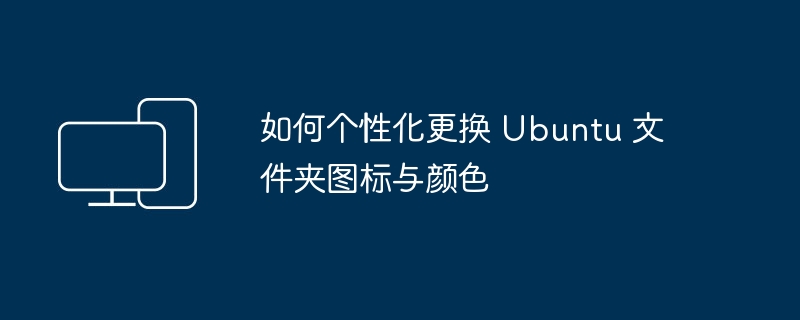

Changing the icon or color of a folder in Ubuntu can improve the efficiency of file management and make it easier to identify folders. You can select the appropriate icon according to the content category of the folder, such as music, documents, pictures, etc., to quickly distinguish and find the folder you need.
Ubuntu supports using common PNG, JPG or SVG format images as folder icons. Websites such as Icon Archive, Iconfinder and Flaticon offer many beautiful folder icons and themes for Linux. We have previously recommended the ten best icon themes for Ubuntu. You can download your favorite icons from these sites and apply them to your folders at any time.
Changing folder icons on Ubuntu is very easy. In just a few simple steps, you can choose a new icon for a folder, significantly improving your personalized experience.
1 Open the Nautilus file manager, find and right-click the folder where you want to change the icon, and then select "Properties".
2 In the pop-up "Properties" window, click the current folder icon.
Click to change Ubuntu folder icon
3 Browse to the folder where the icons are stored, select the icon you want to use, and then click the "Open" button.
After completing the above steps, the icon of the selected folder will be replaced with a new one.
Changed folder icon
If you just want to change the color of the folder, but don't want to change the icon, you can usefolder-colorThis very practical extension can be used. Not only can it easily change the color of Ubuntu folders, it can also add badges such as "Important", "In Progress", "Completed", "Collection" and "New" to the standard icons, which greatly enhances the intuitiveness and ease of file management. efficiency.
Please follow the steps below to install and use thefolder-colorextension:
1Open "Terminal" and enter the following command to installfolder-color:
sudo apt install folder-color
Install the folder-color extension
2 After the installation is complete, you need to restart the Nautilus file manager for the extension to take effect. Enter the following command in "Terminal" to restart:
nautilus -q
3 After restarting, right-click on any folder and you will see a new “Folder’s Color” option.
4 You can choose your favorite color from several colors or select "Custom" to customize the color; or add a badge to the folder.
Select Ubuntu folder colors and badges
5After selecting, the folder will immediately refresh the selected color or badge style.
Changed folder colors and badges
If you want to batch change the color or badge style of multiple folders, just select these folders and select the appropriate one from the right-click menu.
Using thefolder-colorextension not only allows folders to be displayed in more distinctive colors, but also allows the status of folders to be visually marked through badges, thereby quickly identifying folders of different categories and effectively improving Work or study efficiency.
To restore the Ubuntu folder icon or color to the default style, you can follow the steps below:
1 Right-click on the folder where you want to restore the default icon and select "Properties".
2 In the pop-up "Properties" window, click the current custom icon.
3Select the "Undo" button in the pop-up window.
Restore default folder icon
After completing these steps, the folder icons will be instantly restored to Ubuntu's default appearance.
If you have used thefolder-colorextension tool to change the folder color before, you can easily restore it:
1 Right-click on the folder to be restored and select the “Folder’s Color” option.
2 In the pop-up color selection menu, select the "default" option.
Restore default folder icon
In this way, the folder color will be restored to the default Ubuntu appearance.
folder-color The extended "default" button can also undo changes made through the folder "properties". However, changes made using the folder-color extension, such as changing colors, adding badges, etc., cannot be undone via the Undo button in the folder properties.
The above is the detailed content of How to Personalize Ubuntu Folder Icons and Colors. For more information, please follow other related articles on the PHP Chinese website!




